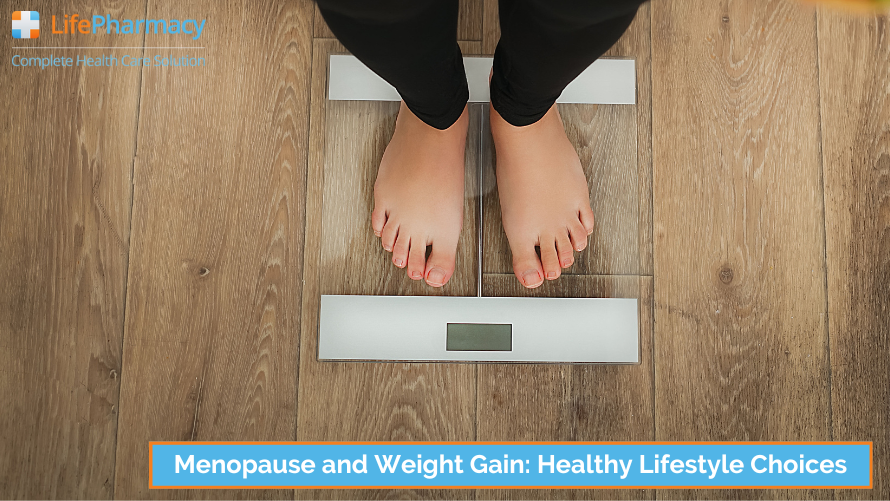Pharmacy Online is here to explain the reasons behind this phenomenon and unravel pathways for women to maintain their vitality and well-being post-menopause.
Causes of Menopausal Weight Gain
The uninvited weight gain in menopause is intimately linked to the diminishing production of estrogen and progesterone – the dynamic duo essential for fertility and conception. When women go through menopause, the decrease in estrogen levels can slow down their body’ capacity to burn calories, causing them to gain more body fat.
It's important to note that menopause isn't the sole influencer of weight changes during this period.
-
Genetic Factors
Hereditary tendencies towards gaining abdominal weight can increase an individual's predisposition to gaining weight. For instance, if your mother tended to gain weight during this phase, you, too are likely to experience it.
-
Life Transitions
Life transitions like children leaving home, divorces, smoking, excessive alcohol consumption, antidepressant use, and relationship or job issues can all complicate weight management. Stressful times can exacerbate these challenges, making weight control during menopause a struggle shared with other life stages.
-
Extrinsic Factors
An unhealthy diet and sleep deprivation can prove to be significant contributors to weight gain. Insufficient sleep often leads to increased snacking and caloric intake.
-
Age-Related Changes
Additionally, as we age, the energy we expend naturally dwindles, as physical activity tends to decrease among older adults. Furthermore, health limitations that hinder exercise can present yet another barrier to overcome.
Impact of Weight Gain During Menopause on Health

As menopause sets in, the inevitable increase in waistline measurements can extend beyond mere cosmetic concerns. Notably, gaining weight with menopause has been linked to an array of complications that warrant serious consideration due to their potential gravity.
-
Psychological Well-being
The correlation between weight gain and mental health cannot be overlooked. An increased risk of depression often parallels a surge in weight during menopause. Menopause can aggravate emotional upheaval, adding a layer of complexity to the physical challenges.
-
Cardiovascular Consequences
In the aftermath of menopause, maintaining a healthy heart demands sustained attention. The cardiovascular system becomes the center of focus as the weight accumulates. Heart conditions and blood vessel diseases emerge as potential outcomes, exacerbating the need for vigilance in managing weight fluctuations during this phase.
-
Metabolic Underpinnings
Type 2 diabetes, a metabolic disorder, emerges as a looming threat as the scales tip upwards. The intricate link between weight gain and insulin resistance makes it necessary to take proactive measures to mitigate this risk.
-
Cancer Connections
The repercussions of weight gain with menopause increase cancer vulnerability. It heightens the likelihood of breast, colon, and endometrial cancers, reinforcing the link between body weight and cancer susceptibility.
-
Pre-existing Conditions Intensified
For those already grappling with chronic conditions like type 2 diabetes or hypothyroidism, the weight gain of menopause can further worsen their symptoms. Our diabetes testing kit can come in handy in keeping a record of your blood insulin levels.
Navigating Menopause Weight Gain

Menopause weight gain is a gradual and inevitable process; there is no one-size-fits-all approach to prevent it entirely. However, by adopting a wholesome lifestyle guided by medical expertise, it's possible to manage and alleviate menopause-related weight gain.
-
Balanced Exercise Routine
Adopting a diversified weekly exercise regimen is advisable to achieve holistic fitness. It should encompass:
-
Cardiovascular Exercises: These activities aid in fat burning and fortify heart health.
-
Strength Training with Weights: This exercise sustains and potentially enhances muscle mass.
-
Yoga or Pilates: These practices enhance flexibility, boost metabolism, and promote robust bones and muscles. These exercises are especially important as bone density decreases during menopause, increasing the risk of osteoporosis.
The decline in muscle mass often confronted by older adults can be countered through dedicated strength training exercises. These exercises help retain your existing muscle mass and facilitate the restoration of muscle lost due to inactivity. Furthermore, resistance training significantly aids in preventing conditions like osteoporosis.
Constructing a comprehensive routine targeting diverse muscle groups, including arms, legs, glutes, and abs, is the hour's need. Engaging in strength training at least twice a week yields optimal results. It's paramount to approach strength training prudently, avoiding excessive strain to minimize the risk of injuries.
-
Aerobic Activities
Integrating aerobic activities into your routine is indispensable if you aim at an optimal weight. Aim for at least 2 hours and 30 minutes of weekly engagement, with a willingness to embrace novelty and variety. You could try new workout DVDs, participate in invigorating fitness classes, or embark on more challenging walking paths. Collaborating with an exercise partner can invigorate motivation and commitment.
Engaging in aerobic exercise offers multidimensional benefits that extend beyond weight management. Regular aerobic activity enhances caloric expenditure and promotes muscle development, contributing to calorie metabolism. Additionally, aerobic exercises positively impact heart health post-menopause. It also boosts physical and mental well-being, eventually influencing sleep patterns and emotional equilibrium.
-
Mindful Eating
-
Caloric Intake and Food Choices:
As you approach 50, studies indicate that your body might require 200 fewer calories daily than your younger years. Be extra vigilant of high-calorie foods, like beverages and snacks, which can significantly elevate your overall caloric intake due to their high sugar content.
-
Nutrition-Packed Choices:
To effectively manage weight during menopause, you must make mindful choices in your dietary selections. Prioritize a diet rich in fruits, vegetables, and whole grains that are particularly high in fiber and devoid of processed content.
Turn towards plant-based options such as legumes, nuts, soy, fish, and low-fat dairy. Limit meat consumption and consider fish and seafood as healthier alternatives to red meat.
Healthy fats from sources like olives and nuts can be part of your dietary repertoire but remember that they carry the same caloric content as less healthy options. Alternatively, you can acquire fish oils supplements from a UK online pharmacy to address deficiencies in your nutritional requirements and support heart health.
Have you ordered your dosage of fish oil supplements?
Discover the benefits of high-quality fish oil supplements from Life Pharmacy UK.
- Consideration for Carbs:
Managing carbohydrate intake, especially from processed or refined sources like bread and pasta, is key to preventing excess belly fat.
-
Meal Timing and Portion Control:
Effective meal timing can be pivotal in managing weight. Starting your day with a substantial breakfast, focusing on lean protein, and opting for a lighter supper align with optimal meal timing. Research suggests that a meal around noon can improve weight management.
-
Snacking and Timing:
To prevent overeating, avoiding excessive snacking and late-night eating is important. Mindful consumption during afternoon hours and adherence to an 8 to 12-hour eating window can align with circadian rhythms and aid in weight control.
-
Improved Sleep Strategies
A prevalent symptom of perimenopause is insomnia, which can persist for a considerable duration of four to eight years. The prolonged experience of waking up unrefreshed often results in exhaustion and deters engagement in physical activities like workouts, leading to fat accumulation.
The impact of inadequate sleep is evident in hunger-regulating hormones, ghrelin and leptin. Rectifying sleep deprivation is significant as compromised sleep disrupts the functionality of these hormones, potentially hampering weight loss efforts.
Avoiding food consumption before sleep becomes paramount to preserving sleep quality. Aiming for a minimum of seven to eight hours of sleep each night is recommended, understanding that this requirement varies individually and over time.
Creating a cooler sleep environment helps beat hot flashes and night sweats, contributing to more restful sleep. Additionally, disconnecting from glowing screens at least an hour before bedtime proves beneficial.
Prioritizing quality sleep is a significant contributor to feminine health, especially during the transitional phase of menopause.
-
Addressing the Stress-Fat Connection

Remember to consider the intricate relationship between stress and fat accumulation. Chronic stress can lead to elevated cortisol levels as this hormonal response can contribute to fat deposition deep within the abdominal region.
Cortisol (stress hormone) is pivotal in triggering the liver to increase blood sugar production and facilitate the conversion of fats, proteins, and carbohydrates into energy. While cortisol is a natural response during stress for an energy boost, persistently high levels due to chronic stress can result in insulin resistance and type 2 diabetes.
To counteract stress and potentially mitigate belly fat accumulation, consider incorporating quick and effective techniques to promote relaxation:
-
Nature's Soothing Influence
Online chemists recommend spending time outdoors amidst greenery to reduce stress. Looking at images of trees can induce a sense of reduced stress.
-
Mindful Meditation
Engage in timed meditations, even for just five minutes. These practices can lower heart rates and keep stress at bay.
-
Crafting Calm
Engaging in needlework activities such as knitting or crocheting can go a long way in alleviating stress. These hobbies can evoke feelings of calmness, happiness, and productivity.
-
Controlled Alcohol Consumption
While alcohol may temporarily relieve stress, it is futile to consider it as a long-term stress coping mechanism. Additionally, the sugars from alcoholic beverages and mixers can contribute to the accumulation of belly fat, further aggravating the situation.
-
Professional Support
If efforts to reduce sugar, alcohol intake, or overeating prove challenging, seeking assistance from a counselor or primary care doctor is essential. Unprocessed emotional energy or underlying conditions such as trauma, depression, or anxiety might influence behavior patterns.
Conclusion
As we navigate the intricacies of menopause, proactively adjusting our lifestyles can significantly impact weight management. While many find success, some may encounter persistent challenges. If your efforts have yet to yield the desired results, it's important to understand that seeking medical help is a crucial step forward.
Consulting a professional can provide precise knowledge regarding your situation, helping you make informed decisions about your health and well-being. Life Pharmacy UK is ready to serve as your partner in health and wellness. Your health matters to us and we're here to help you navigate this journey with our quality meds 24/7.






